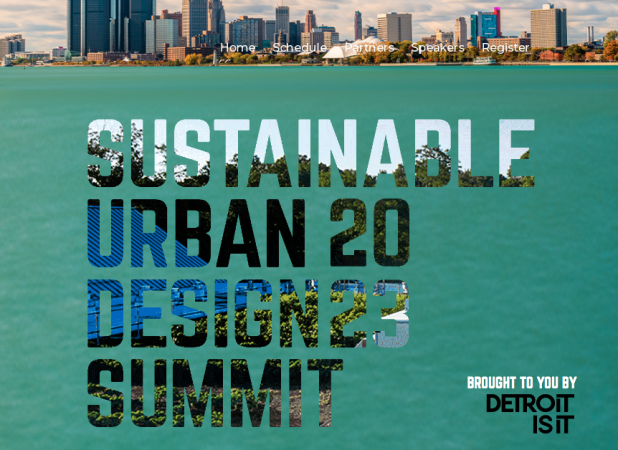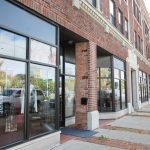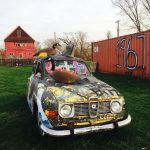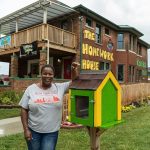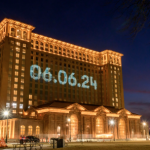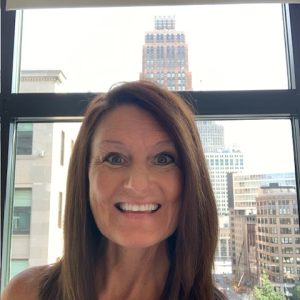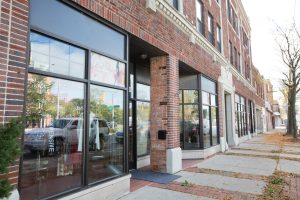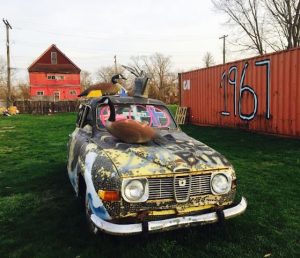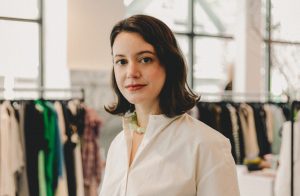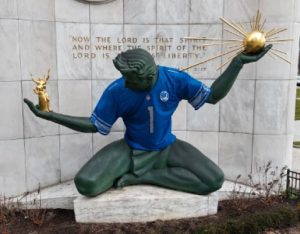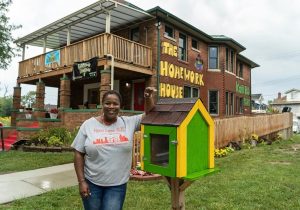On November 9, Detroitisit will bring together urban planners, mobility innovators, community developers, neighborhood association leaders, and design experts from corporate, public, private, and philanthropic sectors for the third annual Sustainable Urban Design Summit focused on shaping sustainable city futures.
After focusing on the built environment in 2021, and climate, energy, and social justice in 2022, the mission of the 2023 Summit is to leverage the future-focused mindset of applying solution-based design thinking to urban development, mobility, community engagement, and readiness toward the circular economy.
Supported by the Consulate General of the Kingdom of the Netherlands, Visit Detroit and Bedrock, the free event will take place at New Lab and run from 9 a.m. to 9 p.m.
Register to attend Thursday, November 9, here.
One of the three main topics is Neighborhood Development which will explore challenges and vision for the development of neighborhoods in the social domains including design, investments, and planning, the socio-economic dynamic, equity, empowerment, and the interdependency of a built community.
Here, three of the speakers Jermaine R. Ruffin, Senior Vice President of Neighborhoods, Invest Detroit, Melanie Markowicz, Executive Director, Greektown Neighborhood Partnership, and Donna Givens Davidson, President and CEO, Eastside Community Network, share some initial insights on the specific work they are doing in their neighborhoods as it pertains to – and will lead into – thought-provoking discussions and ideas at the summit.
DII: What are your goals in terms of design and planning?
Ruffin: Our goals are to provide a higher quality of life to the standard that Detroit residents have been seeking. Ultimately, we are working to create generational wealth and neighborhood resiliency that puts residents in a pattern of growth so they do not get displaced. We’ve engaged with residents and shareholders on what they think is the right approach or investments to take place in their neighborhoods and that is the foundation of our work.
Markowicz: Greektown is one of the oldest neighborhoods in Detroit and one of the most visited. Today much of it is owned by multi-generational Greek families. With the $20 million grant we received the Monroe corridor redevelopment will be transformative for Greektown, downtown, and the state of Michigan.
We are redesigning Monroe Street to be pedestrianized in a formal way. Among many things, we are reorienting vehicular traffic, having the potential to close the corridor to vehicles on a regular basis, and making room for outdoor cafes. The approach will support economic development, a greener and more sustainable area, a safer shared street, and more, all while enhancing and embracing the culture and history of this community.
Davidson: Right now, a lot of what do in Detroit is driven by market conditions with the goal of increasing the market value of neighborhoods and commercial strips.
We are working to get policymakers to understand that a city cannot be rebuilt without first taking care of the needs of all the people there. In many cases, it’s less expensive for people to leave versus staying and fighting for their basic needs. We are working to raise voices and ensure that as many people as possible stay.
DII: What is the economic impact of your work?
Ruffin: To date we have created over 78,000 sq feet of commercial space, assisted over 375 housing units, rehabbed 86 single-family homes, and invested in 11 parks and 12 streetscapes. We’ve leveraged over $262 million for the neighborhoods in an effort to raise overall value and quality of life in Detroit neighborhoods.
Markowicz: I think there is a lot of economic opportunity tied in with developing underutilized property. Also, businesses will certainly be impacted via more patronage that will come from the Monroe corridor being pedestrianized. There is a development boom happening around Greektown – other projects all happening at once that I think will tie the area together and give better access to Greektown from the neighborhoods and also downtown, opening up opportunities for a more robust community and economy.
Davidson: When homes are taken away and made vacant this causes a decline in value to every other home in the neighborhood. Conversely, if we keep people from losing their houses or walking away we are retaining value. We need to protect the economic interests of people whose interests have been overlooked for so long. So I think the work we are doing is a stabilizing factor. We are working to stop the decline and create healthier, more sustainable neighborhoods.
DII: What are the community and cultural impacts of your work?
Ruffin:
Both from a community and cultural perspective in Detroit folks are protective of their neighborhoods and they fear being displaced. Many neighborhoods have experienced disinvestment over the past decade. When you experience this and watch properties become vacated and demolished there is a lot of skepticism. Having folks engaged from the neighborhoods and working with them to understand how they fit into the process puts us in a unique position to do placekeeping. Rod Hardiman has been using this term – placekeeping – and I fully agree with it. It’s about allowing community and culture to stay in place and advance as the residents see fit.
Markowicz: Greektown consists of 72 parcels and just over 30 commercial property owners, with human-scaled architecture and has a real charm. Again, many of the businesses are owned by multi-generational Greek families and we want to incorporate that cultural heritage in everything we do. The redevelopment will include artwork and architecture to reflect that and we will promote the historic preservation of all existing assets with respect and integrity.
Davidson: Our community center has 1,100 members who take classes and who have formed clubs of their own. We offer classes around race equity and the history of Detroit. I think the goal is to develop a sense of pride and connection between residents and we promote that in all that we do. We believe that social cohesion is a significant part of community health. We are also an African American run and the majority of residents here are African American – so we are trying to create a framework where we celebrate who we are.
DII: What are the greatest challenges you face?
Ruffin: The biggest challenge in the neighborhood work we do is being consistent with building trust and partnerships. Remaining engaged takes a lot of conversations.
Second is the size of the city. Detroit is 139 square miles and right now we are focused on ten neighborhoods. There is a lot more need and having the money and resources is a challenge.
Markowicz: A challenge is coordinating all the entities to be able to execute this redevelopment. The infrastructure is over 100 years old and we need a lot of partners to be able to address it. I’m grateful that we’ve developed the collaboration and partners we have to make this vision a reality.
Davidson:
I think there is an absence of imagination for how to house people in the world. Homelessness is a growing problem everywhere. As a society, we have to figure out how to make sure we don’t leave people behind. All people deserve a home and our society needs to make sure people don’t go without. It’s a bigger problem than anyone can solve individually. We do what we can but there are limits to what we can do with the funding.
DII: What are the biggest opportunities?
Ruffin: There is a lot of talent and interest and excitement and eagerness to be a part of the future of the city by both residents and stakeholders. The biggest opportunity we have is to create a collaborative atmosphere and strengthen the economic development ecosystem so that folks know where to get support and resources. We have the ability to create an ecosystem that will thrive on its own with residents at the forefront, and that keeps me excited.
Markowicz: The opportunities for Greektown are vast. If we can create this intimate space in Detroit that has this authentic flair and feel, a green element, a community and cultural element, and it’s a local and tourist destination that’s an exciting opportunity. I want to connect the urban thread between the core of downtown and Greektown and beyond to make it a more accessible and safe place for all. In addition to other projects that are happening around us, there will be a complete and dramatic change in the next five years.
Davidson: People! Living through the pandemic changed the way some things look. We were able to get things done quickly and collaborate to create solutions. Therefore, I think there is more tolerance and interest in justice now.
We also have brilliant caring young leaders who can envision a future that’s different from the past and come up with innovative solutions.
Detroit has always been a place of innovation, and I think it may become a place to demonstrate to the world how we can be different.
As always, be sure to subscribe to our newsletter for regular updates on all things Detroit.





